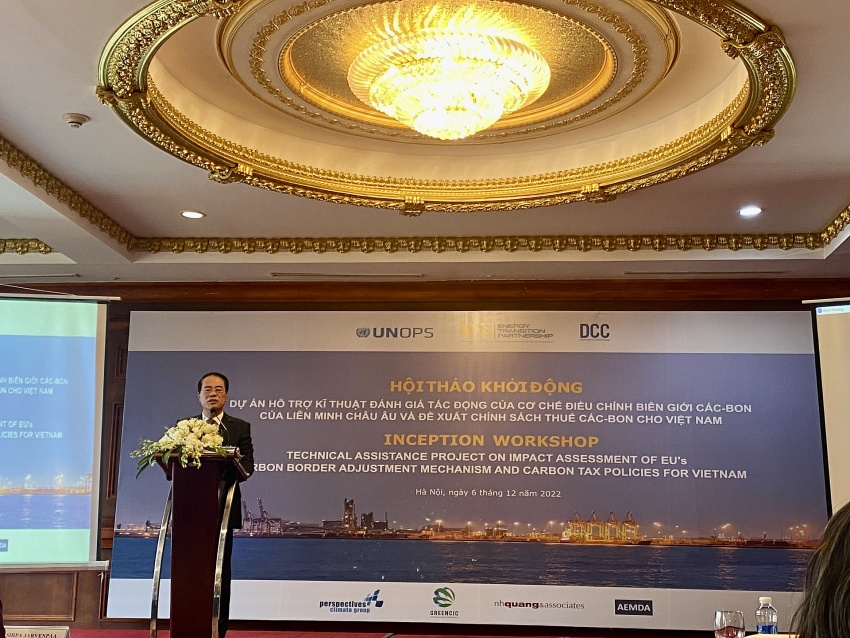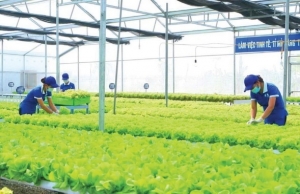Impact assessment of EU’s Carbon Border Adjustment Mechanism begins
 |
| The Technical Assistance Project started in December |
On December 6, the Department of Climate Change, Energy Transition Partnership, and the United Nations Office for Project Services (UNOPS) organised a workshop for the technical assistance project on the impact assessment of EU’s CBAM and carbon tax policies for Vietnam.
The project is one of the key activities within the framework of cooperation in energy transition and greenhouse gas reduction, as indicated in the Memorandum of Understanding between the Department of Climate Change under the Ministry of Natural Resources and Environment (MoNRE) and UNOPS in June 2022.
The project combines a comprehensive study assessing and quantifying the impacts of CBAM on export products (especially energy-intensive industries), energy transition, national economy, and implementation of the Nationally Determined Contribution of Vietnam; and provides recommendations to minimise the negative impact and contributes to the development of the sectoral mitigation plan and carbon market.
During the implementation of the project, stakeholder consultations and workshops will be organised to introduce and consult on recommendations with various ministries, local government, public and private enterprises, associations, and non-governmental organisations.
The project will be implemented by the consortium of Green Climate Innovation Co., Ltd, NHQuang & Associates from Vietnam, Applied Economic Modelling and Data Analysis from Australia, and Perspectives Climate Group GmbH from Germany.
“The project aims to assess the impact of the sea ban on export products, energy transition, national economy, and implementation of the MDCs of Vietnam. It will also provide an in-depth study of the implications and policy recommendations for a roadmap and design of the carbon tax system in Vietnam,” said Nguyen Thi Hong Loan, senior climate change expert at Green Climate Innovation.
Sirpa Jarvenpaa, director of ETP said, “We have a very strong team implementing the project. Today's workshop is the first under this project. And it's a starting point for a longer-term relationship among the implementing partners in MoNRE and the ministers that many of you represent and FOR development partners.”
“During the implementation process of the project and consultants, ETP, together with the DCC at MoNRE, will be arranging stakeholder consultations and works like this to conduct consultations on the findings and recommendations. So we can see the active collaboration of the various ministries, local government, public and private enterprises associations, non-government organisations and other donors in the process.”
In July 2021, the European Commission presented a proposal for a regulation to establish a CBAM as part of initiatives to accelerate the reduction of greenhouse gas emissions and achieve carbon neutrality by 2050.
CBAM aims to address the risk of carbon leakage caused by asymmetrical climate policies between non-EU countries and countries in the EU, complementary to the EU’s Emission Trading Scheme. CBAM certificates, priced equal to ETS certificates, will be issued to importers based on the integrated emissions intensity of the products they import into the EU.
Initially, CBAM will be applied to some products such as the iron, aluminium, cement, electricity and fertilisers sectors, with the possibility to extend to hydrogen, organic chemicals, plastics, and ammonia sectors. With the adoption of the Council and the Parliament in 2022, the proposal is now at the final stage of its legislative process.
The transition period is expected to begin in 2023 and will come into force in January 2026. Although it aims to combat climate change, the EU’s proposed CBAM will affect and impose substantial costs on Vietnam exports, especially if it is extended to other sectors in the future.
According to the 2020 Law on Environmental Protection, Vietnam plans to establish and develop the domestic carbon market, which includes trading emission allowances and carbon credits.
Government Decree No.06/2022/ND-CP provides a roadmap for the development of a regulatory framework and the pilot implementation of the carbon trading scheme from now to 2027 (the carbon trade exchange pilot starts from 2025) and the official operation of the carbon trade exchange from 2028.
Together with the emission trading scheme, the carbon tax is considered an effective carbon pricing instrument for Vietnam to achieve its net-zero target. However, the application of the carbon tax in Vietnam requires a thorough study to achieve an efficient design and fall in line with the trading agreements that Vietnam has signed, as well as to avoid duplication with the existing tax scheme.
 | A win-win situation for greenhouse gas emission cuts Enterprises operating in Vietnam still have opportunities to pay for carbon value or ecology services voluntarily via partnerships with forest owners. These initiatives will provide win-win prospects for domestic enterprises and smallholder forest owners in the effort to cut greenhouse gas (GHG) emissions. |
 | Can Vietnam achieve its goals on net-zero emissions? Vietnam’s economic achievements have been impressive over recent decades but greenhouse gas emissions have risen alongside them. Patrick Lenain, former assistant director at the Organisation for Economic Co-operation and Development, looks at the carbon market for this country moving forward as it tries to meet major emission-reducing targets. |
 | Agro-groups crafting solutions to curb GHG Many agricultural groups in Vietnam are investing in applying modern technologies in their production and business, as part of the nation’s efforts to develop smart agriculture. |
 | Companies stumped by GHG emission obligations Although the Vietnamese government is advocating the development of a low-carbon economy, many businesses are scratching their heads over applying proper solutions to make their performance more environmentally friendly. |
What the stars mean:
★ Poor ★ ★ Promising ★★★ Good ★★★★ Very good ★★★★★ Exceptional
Related Contents
Latest News
More News
- VinaCapital launches Vietnam's first two strategic-beta ETFs (February 26, 2026 | 09:00)
- PM sets five key tasks to accelerate sci-tech development (February 26, 2026 | 08:00)
- PM outlines new tasks for healthcare sector (February 25, 2026 | 16:00)
- Citi report finds global trade transformed by tariffs and AI (February 25, 2026 | 10:49)
- Vietnam sets ambitious dairy growth targets (February 24, 2026 | 18:00)
- Vietnam, New Zealand seek level-up in ties (February 19, 2026 | 18:06)
- Untapped potential in relations with Indonesia (February 19, 2026 | 17:56)
- German strengths match Vietnamese aspirations (February 19, 2026 | 17:40)
- Vietnam’s pivotal year for advancing sustainability (February 19, 2026 | 08:44)
- Strengthening the core role of industry and trade (February 19, 2026 | 08:35)

 Tag:
Tag:


















 Mobile Version
Mobile Version